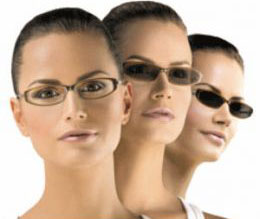Specialty Lenses
Free Form Progressive Lenses
Most patients over 40 select a progressive lens (no line bifocal) because of the improved range of vision and improved appearance when compared to standard bifocals. But some individuals can be bothered by the abberations and distortions caused by these lenses. There is now a new option: Free Form Progressive Lenses. New technology in digital production has allowed improved optics. Each lens is made customized for vision, frame size, and eye parameters. If you are currently wearing a progressive lens and want the best vision possible, this is the lens for you.
Anti-Reflective Coating (AR)
AR coating reduces glare and reflections from all light sources. A few reasons all lenses should have AR coating:
- Glare can reduce vision from 20/20 to 20/40, especially while driving at night.
- Reflections from computer screens and flourscent lighting causes squinting and eye strain.
- Lenses with AR coating look thinner and allow better viewing of a persons face and eyes.
- Since the light cannot be reflected from the lens, more light enters the eye, which gives the patient with AR better vision.
Polarized Sun Glasses
Regular sunglasses help improve vision by blocking the visible sunlight and protect eye health by filtering UV light. But they don't block the reflected light and glare. Polarized lenses contain a special filter that blocks this type of intense reflected light, reducing glare. Outdoor vision for such activities as golfing, boating, biking, and skiing can be greatly improved with polarized sunglasses. Adding AR coating can help make the ultimate sunglass lens, free of all glare and sun reflections.
Transition® lenses
Transition® lenses lighten and darken based on UV conditions (sunlight). In sunlight - they darken. Inside - they become clear. Unlike glass photochromic lenses, they are not sensitive to temperature changes and will not darken in colder temperatures or lighten in extremely hot conditions. Transition Lenses are the clearest, darkest, and fastest photochromics available, offering convenient and automatic protection from UVA and UVB radiation. These lenses enhance your quality of vision by providing the combined benefits of optimal visual acuity, visual comfort, and protection from the damaging effects of UV radiation and glare.

Hi Index Lenses
Regular glass or plastic lenses for high amounts of nearsightedness or farsightedness can be quite thick, heavy, and make the wearer's eyes appear to be larger or smaller than they actually are. Fortunately, we have a variety of new "high-index" plastic lens materials that bend light more efficiently. Less material can be used in high-index lenses to correct the same amount of refractive error, which makes high-index plastic lenses both thinner and lighter than conventional glass or plastic lenses. These materials are also more scratch resistant. If you have a high prescription and are sick of having "coke bottle" lenses, using a hi index lens and AR coating can help thin your lens and make you new glasses more cosmetically appealing.
Thinner, More Impact Resistant Lenses
Our newest eyeglass lenses come from Hoya, a custom lens manufacturer. Hoya's unique plastics create the thinnest lenses available and make even the strongest prescriptions look great. The Phoenix lens from Hoya is made of a new type of plastic that combines the best features of other plastic lenses on the market: it provides great optics, is very impact-resistant, and is thin and lightweight. Phoenix lenses are currently available as single-vision and progressive lenses and will soon be available in flat-top bifocal, aspheric, and variable-tint (photochromic) styles.
Custom-made Progressive Addition Lenses
Hoya, along with Zeiss and Definity, now also manufacture custom-made progressive addition lenses (PAL's) that provide virtually distortion free viewing at all distances.
PROFECTION™ 1.70 from Hoya adds a dynamic dimension to your lens selection with its digitally mastered PROFECTION™ lens series. This ultimate high index material offers patients with higher prescriptions uncompromised visual clarity over a range of distances in the thinnest, lightest, and most fashionable lenses available anywhere in the world.
Our optician needs to take a few more measurements for these special lenses. All of this additional information is then sent to the manufacturer who designs a custom-made lens specifically for you.
Progressive No Line Bifocal Eyeglass Lenses
Varilux Panamic is the newest progressive lens design from Varilux, the company that invented the progressive lens. It is a progressive addition lens, that is, a "no-line" multifocal that provides clear vision at all distances for patients who need bifocal prescriptions. In the past, most progressive designs have left some areas of distortion in the lens that limited the wearer's peripheral vision and yielded a narrow reading area, requiring a lot of head movement to scan across a page. The new Varilux Panamic is a custom-made lens that is designed to minimize distortions. Each lens is manufactured for your specific prescription to yield enhanced peripheral vision and a much wider reading area. These lenses provide vision that seems so natural, you might not be aware that you're wearing a bifocal.
Improved Anti-reflection coatings
Anti-reflection coatings have been around for years and provide you with clearer vision, as well as make your glasses look better. In the past, these lens coatings have been delicate and have required extreme care to avoid scratches. The latest generations of anti-reflective coatings are extremely durable and far superior in performance compared with their predecessors.
Computer Vision Syndrome
Tired and sore eyes, headaches, blurred vision, and general fatigue - these are just a few symptoms of Computer Vision Syndrome (CVS). Currently, CVS is the number one health complaint of office workers nationwide, affecting millions of people, including those with 20/20 vision. A pair of computer lenses, either as single vision, lined-bifocal or progressive addition lenses, can provide relief from computer eyestrain, making you more comfortable and more productive at your computer. Glare from the screen can also be reduced by special coatings and tints applied to your eyeglass lenses. By eliminating glare and the need to constantly refocus, your eyes remain comfortably at rest - even after hours at the computer.
